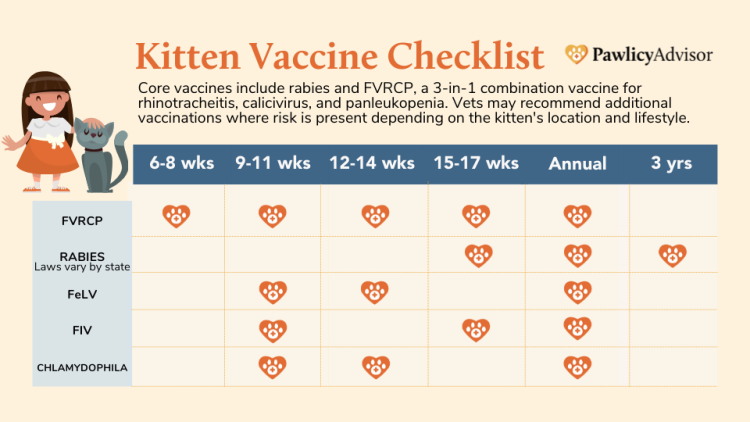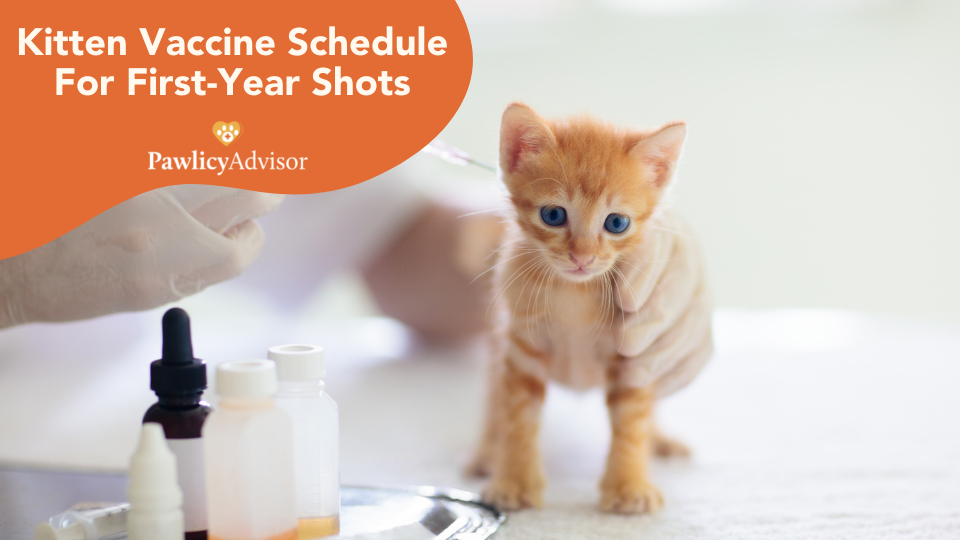One of the most important things you should do in your first few weeks as a cat owner is vaccinating your kitten. Vaccines help protect your pet from serious infectious diseases and prevent them from passing an infection on to other pets in your area.
Learn How Pet Wellness Plans Can Cover Vaccine Costs
But what shots do kittens actually need? When should kittens have all their shots by, and how much do kitten shots cost?
Here’s everything you need to know about first-year kitten vaccines:
- Kitten Vaccination Schedule (Chart)
- What shots do kittens need and when?
- When can you vaccinate a kitten?
- Are there kitten vaccine side effects or risks?
- How much are kitten vaccinations?
- Key Takeaways
- Frequently Asked Questions
Kitten Vaccination Schedule [Chart]

- 6-8 weeks: FVRCP
- 9-11 weeks: FVRCP (2nd round); Optional: FeLV, FIV
- 12-14 weeks: FVRCP (3rd round); Optional: FeLV (2nd round), FIV (2nd round)
- 15-17 weeks: FVRCP (4th round), Rabies; Optional: FIV (3rd round)
- 1-3 years: FVRCP booster, Rabies (2nd round); Optional: FeLV & FIV boosters (annually)
What shots do kittens need and when?
Kittens need vaccination to stay healthy once they no longer have their mother’s immunity to protect them against infectious diseases. Generally, there are two types of kitten shots:
- Core vaccines are essential shots required for all kittens and mature cats to defend against prevalent and/or harmful diseases.
- Non-core vaccines aren't always necessary for all pet cats. Vets recommend these specific immunizations for cats at greater risk of illness. Non-core vaccines require an assessment of your cat's lifestyle and location to determine the present level of risk for infection.
Core Kitten Vaccines
Core vaccines for kittens include feline rhinotracheitis, calicivirus, and panleukopenia, three highly contagious and life-threatening illnesses in cats.
- Rhinotracheitis: This disease is triggered by the feline herpes virus and if left untreated, causes starvation, dehydration, and eventually death.
- Calicivirus: Kittens and senior cats are particularly susceptible to this disease of the respiratory system which can also cause mouth ulcers and develop into pneumonia if left untreated.
- Panleukopenia: Also known as feline distemper or parvovirus, panleuokopenia affects nearly all cats. It develops extremely fast and can kill a cat within 12 hours upon contraction without immediate medical intervention.
The three-in-one combination vaccine known as FVRCP immunizes kittens against these illnesses. It's administered as a shot (given in four rounds) to kittens between the ages of six and eight weeks old, every three to four weeks (over an eight to 14 week period) until they are 16 weeks old.
Rabies, another required kitten vaccine, is a viral infection that can be fatal if left untreated. It affects cats as well as other animals and people. The risk of rabies in outdoor cats is generally higher because they are more exposed to common carriers of the rabies disease — such as foxes, raccoons, and skunks — which can pass the virus onto cats.
Kittens should get their first rabies vaccine no earlier than 16 weeks of age, followed by a second round 12 months later and a booster every three years onward (unless your state laws dictate otherwise).
Non-Core Kitten Vaccines
Optional vaccines for kittens include:
- Feline Leukemia Virus (FeLV)
- Feline Immunodeficiency Virus (FIV)
- Chlamydophila felis
- Feline Infectious Peritonitis (FIP)
- Feline Giardia
Feline Leukemia Virus (FeLV)
Feline Leukemia is a viral disease that can be passed to kittens from their mother or be acquired by indoor cats who have access to the outdoors. Some veterinarians recommend the FeLV vaccine for all cats, while others suggest it only for kittens at risk of contracting the disease.
Your cat's lifestyle and your vet’s opinion should guide your decision. FeLV testing should be done on kittens prior to immunization, which can start as early as eight to 12 weeks of age, with a booster shot three to four weeks later.
Feline Immunodeficiency Virus (FIV)
Feline Immunodeficiency Virus is transmitted from cat to cat through bite wounds. FIV immunization is only given to kittens who are at a high risk of contracting the virus. Before being vaccinated, cats should have an FIV test performed. The vaccine isn't totally effective. Immunization starts early, and boosters should be given every two to three weeks for a total of three immunizations.
Chlamydophila felis
The Chlamydophila Felis vaccination should be considered for kittens at risk of exposure to infection, especially in multicat environments, to outdoor cats, and if there’s been a previous history illness. Vaccination generally starts at eight to nine weeks of age, with a booster three to four weeks later at around 12 weeks of age.
Note: The FIP and Giardia vaccinations are generally not advised due to concerns about safety and efficacy. These vaccinations are still under evaluation and veterinarians do not routinely utilize them.
When can you vaccinate a kitten?
According to the VCA Hospitals, kittens have passive immunity from antibody absorption from their mother through the intestine for 24 to 48 hours after birth. This protects them against disease during the first few weeks of life but they need to build longer-lasting active immunity in order to remain protected against these diseases. Vaccines promote active immunity, but they must be given at the correct time.
Because it's impossible to predict when a kitten will lose its short-term immunity, a series of vaccines spaced at regular intervals boost the cat's chances of developing active immunity. The aim is to administer at least two vaccines during the critical window after the kitten loses maternal immunity before exposure to infectious disease.
Kittens need vaccine boosters every one to three years (depending on the type and individual circumstances) to maintain active, long-lasting immunity.
Talk to your veterinarian about your kitten’s lifestyle and discuss their kitten vaccination schedule to determine what’s best for your pet.
Are there kitten vaccine side effects or risks?
You may notice your kitten acting strangely after a vaccine shot, including walking with a limp, a lack of appetite, lethargy, nausea or vomiting, aggression, and crying.
However, most pet experts and veterinarians agree that the benefits of kitten vaccines far outweigh the possible risk of side effects, especially when in young animals — the most at-risk population.
How much are kitten vaccinations?
The cost of kitten vaccinations will depend on several factors, including where you live, which veterinary clinic you go to, which vaccine you get, etc. Individual vaccinations for kittens can cost anywhere from $20 to $45. Most vets will want to complete a physical exam before vaccinating your pet, adding another $50 to $100 to the total cost. During the vet visit, your pet might require more than one vaccination (for example, a rabies shot and their final round of the FVRCP vaccine) which also increases cost.
Purchasing a wellness plan through a pet insurance company is one method to save money on kitten vaccinations. Wellness plans cover things like microchipping, annual wellness checks, routine dental treatment, spaying/neutering, and other preventive pet care services plus vaccines.
Pawlicy Advisor can assist you in comparing pet health insurance policies and wellness plans from leading pet insurance companies to discover the best coverage for your kitten's specific requirements.
Explore Pet Insurance Plans For Cats Are Pet Wellness Plans Worth It?
Key Takeaways
- Vaccination is the best way to protect your kitten from infectious diseases and keep them as safe and healthy as possible.
- All kittens are required to get core vaccines, which include feline rhinotracheitis, feline calicivirus, feline panleukopenia, and rabies. Non-core vaccines should be considered based on where you live and your cat’s lifestyle.
- During the first vet visit, your vet will consider the risk factors and advise you on which vaccines are best for your kitten.
- Purchasing a wellness plan through your pet insurer can help you save on a variety of routine and preventive care services, including vaccinations.
Frequently Asked Questions
Do I have to get my kitten vaccinated?
Vets recommend that all kittens — both indoor and outdoor — should be given core vaccines in order to keep them protected from a range of extremely contagious diseases.
What vaccines do indoor kittens need?
There are two primary vaccines indoor kittens need in order to stay healthy throughout their life: the combination vaccine FVRCP — which protects against feline rhinotracheitis, feline calicivirus, and feline panleukopenia, and the rabies vaccine.
Can you have an unvaccinated kitten around a vaccinated cat?
Yes. Spending time with healthy, fully vaccinated cats should be safe for your kitten.
How old can a cat be vaccinated?
Kitten vaccinations are started at six to eight weeks of age and are repeated every three to four weeks until the kitten is four months old.
What happens if my kitten missed a second vaccination?
Your kitten's immune system will be less active if they miss a second (booster) vaccine by more than two weeks. This indicates that the future vaccine will elicit a weaker immunological response. If your pet has been late for the appointment for more than three or four weeks, they might require two injections, spaced two or three weeks apart, in order to enhance their protection. This rule does not apply to rabies immunizations.
When do you deworm kittens?
Veterinarians should deworm kittens is at two, four, six, and eight weeks old. All kittens and cats should be treated with a monthly heartworm and flea preventative that also treats and controls roundworms and hookworms.
Is there a heartworm kitten vaccine?
No, there is no commercially available vaccination to prevent heartworm disease in cats at this time.
Can you get free kitten vaccinations?
Animal shelters often charge less for vaccination and might even provide vaccines free of charge. You can also visit a low-cost vaccination clinic. These clinics usually offer packages that combine different vaccinations for a discounted price, along with individual vaccine options if your kitten is due for a specific vaccine.
